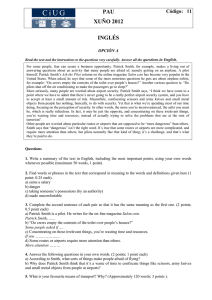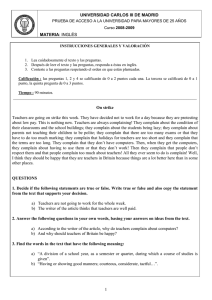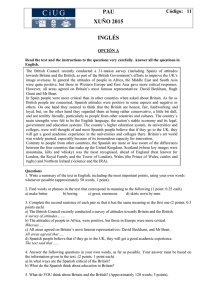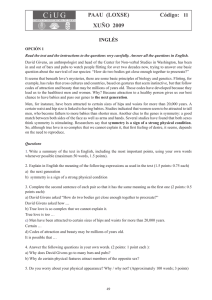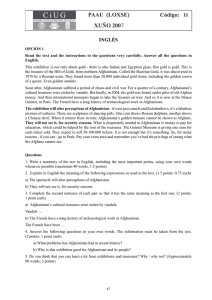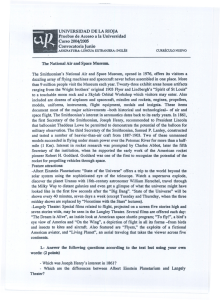2006 - Ciug
Anuncio
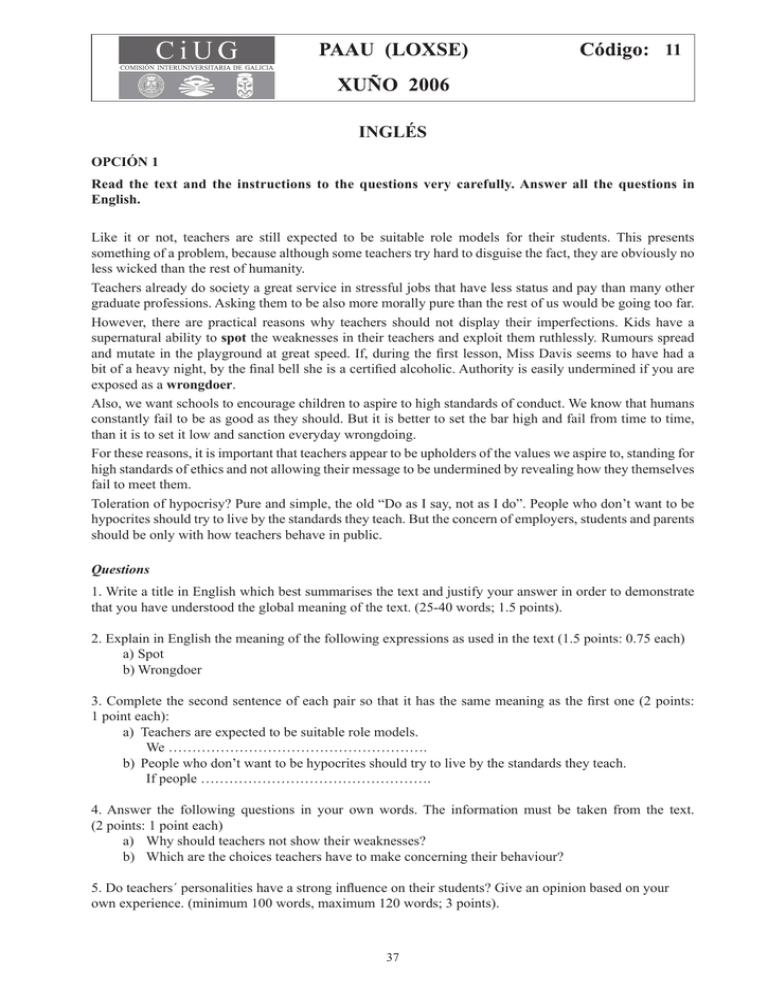
11 INGLÉS OPCIÓN 1 Read the text and the instructions to the questions very carefully. Answer all the questions in English. Like it or not, teachers are still expected to be suitable role models for their students. This presents something of a problem, because although some teachers try hard to disguise the fact, they are obviously no less wicked than the rest of humanity. Teachers already do society a great service in stressful jobs that have less status and pay than many other graduate professions. Asking them to be also more morally pure than the rest of us would be going too far. However, there are practical reasons why teachers should not display their imperfections. Kids have a supernatural ability to spot the weaknesses in their teachers and exploit them ruthlessly. Rumours spread and mutate in the playground at great speed. If, during the first lesson, Miss Davis seems to have had a bit of a heavy night, by the final bell she is a certified alcoholic. Authority is easily undermined if you are exposed as a wrongdoer. Also, we want schools to encourage children to aspire to high standards of conduct. We know that humans constantly fail to be as good as they should. But it is better to set the bar high and fail from time to time, than it is to set it low and sanction everyday wrongdoing. For these reasons, it is important that teachers appear to be upholders of the values we aspire to, standing for high standards of ethics and not allowing their message to be undermined by revealing how they themselves fail to meet them. Toleration of hypocrisy? Pure and simple, the old “Do as I say, not as I do”. People who don’t want to be hypocrites should try to live by the standards they teach. But the concern of employers, students and parents should be only with how teachers behave in public. Questions 1. Write a title in English which best summarises the text and justify your answer in order to demonstrate that you have understood the global meaning of the text. (25-40 words; 1.5 points). 2. Explain in English the meaning of the following expressions as used in the text (1.5 points: 0.75 each) a) Spot b) Wrongdoer 3. Complete the second sentence of each pair so that it has the same meaning as the first one (2 points: 1 point each): a) Teachers are expected to be suitable role models. We ………………………………………………. b) People who don’t want to be hypocrites should try to live by the standards they teach. If people …………………………………………. 4. Answer the following questions in your own words. The information must be taken from the text. (2 points: 1 point each) a) Why should teachers not show their weaknesses? b) Which are the choices teachers have to make concerning their behaviour? 5. Do teachers´ personalities have a strong influence on their students? Give an opinion based on your own experience. (minimum 100 words, maximum 120 words; 3 points). 37 11 INGLÉS OPCIÓN 2 Read the text and the instructions to the questions very carefully. Answer all the questions in English. The crowd cheered as the notorious highwayman, Jack Cade, climbed onto the waiting farm cart in 1779. After two weeks alone in a cold, damp prison cell, living on bread and water, he was going to pay for all the coaches he had robbed. With a smile, he slowly peeled off his silk jacket and threw it to them. He placed the rope carefully round his own neck. “It’s not the kind of necktie I really like,” he said, “but still, my friends, I’ve no real regrets, for I’ve always enjoyed living life sweetly to the full. I do not have anything to fear, because although my business was robbing coaches, I have never hurt anyone. I have enjoyed more than my share of wine, women and song, so let’s part smiling.” A man fired a shot and the horse ran away with the cart, watched by a tearful girl who was 3 months pregnant by him. After struggling for twenty minutes, Jack Cade died, hanged from the Hanging Tree, which grows next to the smallest prison in the world. It was built in 1521 by Henry VIII and is only 2 metres wide. The villagers named it “The Cage”. The story of Cade did not end there. Villagers reported sightings of his ghost, and the Archbishop sent a priest to exorcise it, but in November 1912 over a dozen people reported seeing the ghost. A well-known medium, Mrs Ada Garvey, held a séance inside The Cage the following year to make contact with his spirit. The ghost made contact and said he was waiting for his lady love to return to him. He’s still waiting. Questions 1. Write a title in English which best summarises the text, and justify your answer in order to show that you have understood the global meaning of the text (25 – 40 words; 1.5 points). 2. Explain in English the meaning of the following expressions as used in the text. (1.5 points: 0.75 points each) a) Living life sweetly to the full. b) She held a séance. 3. Complete the second sentence of each pair so that it has the same meaning as the first one (2 points: 1 point each). a) The prison was built in 1521 by Henry VIII and is only 2 metres wide. The prison, which ………………………………………. b) He said he was waiting for his lady love to return to him. He said: “I ……………………………………………… 4. Answer the following questions in your own words. The information must be taken from the text (2 points: 1 point each). a) Why do you think Jack Cade was popular with the crowd, although he was a notorious criminal? b) In what way was justice harder in eighteenth century England than in Spain nowadays? 5. Write about three criminal offences and the punishments you think they should receive. (minimum 100 words, maximum 120 words; 3 points) 38 11 INGLÉS Opción 1: Read the text and the instructions to the questions very carefully. Answer all the questions in English. This is not the world we once knew. The world is controlled by computers. Men and women can be seen, but they are following the orders given to them by machines. Does this scenario sound familiar? You have probably read something like it in magazines or science – fiction books, or seen it in films. Why is the theme so popular? One of the reasons is undoubtedly that it reflects the fears of many people: fear of the unknown, fear of what is not understood, or, at least, fear of something that is partially comprehended. This fear is perhaps not very different from the way witches and black cats were feared in the Middle Ages. The fact is that every day it seems that computers take control of another area of our lives. Some factory jobs are now done by robots and the robots in turn are controlled by computers. Our bank accounts are managed by computers. At the airport, our tickets are issued and our seats are assigned by a computer. Certainly, many of these operations are made more efficient by computers, but our admiration is sometimes combined with feelings of insecurity. And this insecurity is caused by the fact that we don’t know how computers do these things, and we really don’t know what they might do next. But we can find out how computers work, and once we understand them we can use computers instead of worrying about being used by them. Questions 1. Write a title in English which best summarises the text, and justify your answer in order to show that you have understood the global meaning of the text. (Minimum 25 words, maximum 40 words; 1.5 points) 2. Explain in English the meaning of the following expressions as used in the text (1.5 points: 0.75 points each) a) Fear of the unknown. b) Feelings of insecurity. 3. Complete the second sentence of each pair so that it has the same meaning as the first one. (2 points: 1 point each) a) Computers are controlling our lives. Our lives ... b) You have probably read something like it in magazines. It is likely … 4. Answer the following questions in your own words. The information must be taken from the text (2 points: 1 point each). a) In what ways is the world being dominated by computers? b) Why do some people fear computers? 5. Do you think that computers make the world less human? Explain your answer. (Minimum 100 words, maximum 120 words; 3 points) 39 11 INGLÉS Opción 2: Read the text and the instructions to the questions very carefully. Answer all the questions in English My name is Claire. Last summer I was walking through Covent Garden and a woman from a modelling agency came up to me. She asked if I’d ever thought of modelling, and I said: “No, never.” But I was signed up and started modelling in the school holidays. I decided to go into it full time this year. My parents supported the decision, though they would rather I’d stayed on at school and gone to University. But they are fairly keen on show business themselves. It’s a very competitive profession. You have to be very self-disciplined: eating the right things, exercising, looking your best when you get up in the morning. It sounds easy but it’s hard work. When you go on castings all the models look you up and down; but a lot of them are very friendly. I would say male models are more vain: all the ones I’ve met seem terribly in love with themselves. They are not the people I see at weekends. I spend most of my time with my boyfriend, who’s a computer programmer, or with old friends. Modelling is a lot of fun but it’s not something I want to do as my career. It’s always been my ambition to be rich and famous, but what I really want to do is be a singer. I know people say models always go on to acting and singing and can’t do it, but if I’m making money I don’t really care what they say. Questions 1. Write a title in English which best summarises the text, and justify your answer in order to show that you have understood the global meaning of the text. (25 – 40 words; 1.5 points) 2. Explain in English the meaning of the following expressions as used in the text (1.5 points: 0.75 points each). a) I decided to go into it full time b) they are fairly keen on show business 3. Complete the second sentence of each pair so that it has the same meaning as the first one. (2 points: 1 point each) a) She asked if I’d ever thought of modelling. She asked: “........................................................”. b) It’s always been my ambition to be rich and famous I have always … 4. Answer the following questions in your own words. The information must be taken from the text. (2 points: 1 point each) a) What would Claire’s parents have preferred her to do? b) What does she dislike about modelling? 5. What is your opinion about “fashion” and the “fashion world” nowadays? (Minimum 100 words; maximum 120 words; 3 points) 40 CONVOCATORIAS DE XUÑO E SETEMBRO 1. Contido e puntuación: 3. Se existise unha comprensión total do texto e unha expresión gramatical correcta, a puntuación será máxima, sempre que o alumno introduza elementos expresivos persoais. Primeira pregunta: Suxerir un título e xustificar a súa elección, demostrando entender o significado global del texto. Mínimo 25 palabras, máximo 40 palabras. (1,5 puntos) 4. Se existise unha comprensión total do texto, mais a expresión non fose gramaticalmente correcta, faranse as deducións oportunas, dependendo da gravidade da incorrección ou erro. As deducións faranse, entón, axustándose á importancia cualitativa do erro e do número de erros que se cometan na mesma pregunta. A modo orientativo, os erros de expresión básicos (faltas de concordancia, indebida ou inexacta orde de palabras, erros na formación de interrogativas ou negativas, etc.) serán penalizados de forma considerable. Segunda pregunta: Explicar o significado dunha palabra, frase ou expresión do texto nas propias palabras do alumno. Constará de dúas partes cunha puntuación de 0,75 puntos para cada parte. (1,5 puntos) Terceira pregunta: Transformar unha parte ou o total dunha frase tirada do texto noutras palabras para que signifique o mesmo, utilizando unha das estruturas contidas no Deseño Curricular Base de Inglés do Bacharelato. Constará de dúas partes, cunha puntuación de 1 punto para cada parte. (2 puntos) 5. Se a comprensión for parcial a puntuación máxima asignada á pregunta verase reducida de acordo coa gravidade da falta de comprensión. Cuarta pregunta: Dúas preguntas acerca do significado do texto. As respostas deben demostrar que o alumno o entendeu correctamente. Constará de dúas partes cunha puntuación de 1 punto para cada parte. (2 puntos) 6. Se non houber ningunha comprensión, a pregunta non pode ter ningún tipo de cualificación positiva. 7. Os erros ortográficos puntuaranse negativamente de acordo co seu número e importancia (serán máis graves en palabras básicas da lingua inglesa). Como criterio xeral, deberá penalizarse, como mínimo, unha décima por erro ortográfico. Un erro repetido na mesma palabra só se penalizará unha vez. Quinta pregunta: Unha pregunta acerca dun tema relacionado co tema do texto. A resposta, en forma de redacción, debe conter un mínimo de 100 e un máximo de, aproximadamente, 120 palabras. (3 puntos) 2. Terase en conta a comprensión, expresión e corrección escritas. Por unha parte, o corrector valorará se existe unha comprensión total ou parcial do texto por parte do alumno. Por outra parte, o corrector terá en conta a capacidade do alumno para se comunicar de forma efectiva (avaliación da súa co mpetencia comunicativa), a coherencia e ordenación lóxica na exposición das ideas, a riqueza do léxico, sen esquecer a expresión gramatical correcta (competencia lingüística) das respostas. 8. Se se transcribise literalmente un fragmento do texto como resposta a todas ou a unha das preguntas, aínda que este fragmento estivese relacionado co contido da pregunta, valorarase cunha puntuación máxima do 50% do total atribuíble á puntuación correspondente a cada pregunta ou cuestión, así que debe interpretarse que non necesariamente a puntuación debe ser un 0,5. 41 June 2006. Opción 1 Possible Answer September 2006. Opción 1 Possible Answer 1. “Teachers, society and moral standards”. This is a good title because the text talks about society’s attitude to teachers, and the example they should give to their students. 2. a) Spot = notice / see / find out / find / recognise, etc. b) Wrongdoer = a person who does something that is wrong / who does bad / wrong things, etc. 3. a) We expect teachers to be suitable role models. b) If people don’t want to be hypocrites, they should try to live by the standards they teach. 4. a) Teachers should not show their weaknesses because they are role models for their students and because children notice when they do something wrong and tell other children. b) They have to choose if they want to be real, authentic role models with high standards and decent bahaviour, or not. OR They can either be hypocrites (doing one thing in public and another in private), or live by the same standards that they teach the children. I really believe that teachers’ characters are very important, because children can be shocked or impressed very easily at that age. We are with them for a long time every day, more than with our parents or our brothers and sisters. I had a history teacher who taught us history but also about life and I will never forget her. I think she had a stronger influence on me than my parents, and she changed my attitude to other countries and people whose skin is a different colour. On the other hand, sometimes this is not a good thing. My brother was very afraid of his geography teacher and on Wednesdays he was always ill in order to avoid that subject. 1. A possible title could be “The fear of computers”. The text says that people are afraid of computers because they control our lives more and more every day, and we do not understand them. 2. a. Fear of the unknown. This means that / This happens when ... we are afraid of the things that we do not know, (such as how computers work). b. Feelings of insecurity. This means that / This happens when / We have this feeling when ... we do not feel secure / safe. 3. a. Computers are controlling our lives. Our lives are being controlled by computers. b. You have probably read something like it in magazines. It is likely that you have read something like it in magazines. 4. a. Computers dominate the world because they control robots, our bank accounts and other things. They do a lot of the work in factories and airports, where they give us our tickets and the number of our seat in the aeroplane. b. Some people are afraid of computers because they do not understand them and do not know anything, or very much, about them, so they believe that computers are dominating the world. 5. I do not think this sentence is true. On the contrary, the world is less human because of other things, such as wars, guns and pollution, which are happening in places where there aren’t any computers, for example in Africa. Computers, I believe, can help us to be more efficient, to live better and to do our jobs faster and better. For example, cars work much better nowadays because everything in them works with mini-computers and chips. We can communicate with our friends with them on the Internet, learn anything we want, and besides computers also give us a lot of fun when we play games. June 2006. Opción 2 1. “The life and death of Jack Cade.” This is a good title because it tells the story of all the things he did during his life and the way he was executed, paying for the crimes he had committed. 2. a) living life sweetly to the full = living the best life he could / enjoying life as much as he could. b) She held a séance = She celebrated a session where she tried to contact (make contact with) the spirit of a dead person. 3. a) The prison, which is only two metres wide, was built in 1521 by Henry VIII. / The prison, which was built in 1521 by Henry VIII, is only two metres wide. b) He said: “I am waiting for my lady love to return to me.” 4. a) Jack Cade was popular, first, because he smiled when he was going to die, also because he had never hurt anyone (he had only robbed them) and because he had enjoyed life (wine, women and song). b) Justice was harder because people were killed for robbing, and they were put in small, cold prisons alone. In Spain nowadays this would not happen. You can study, do sport and watch TV. 5. The three offences I have chosen are robbing, murder and writing graffiti. For robbing, I would make them give back the money or objects they have stolen. If they cannot, the criminals should work until they earn enough to pay. For murder, I believe the murderer should stay in prison for the rest of his life or be hanged like Jack Cade. When young people write graffiti, they should clean the wall, unless they have made it more beautiful with a picture of a beach or a tree, for example. In this case, they should receive a prize instead of being punished. September 2006. Opción 2 1. A good title would be “My life in the world of fashion”, because Claire talks about her experience of the business of fashion, in modelling clothes and doing castings. 2. a. I decided to go into it full time. I made up my mind / made a decision ... to begin to work in it all the time. b. They are fairly keen on show business. They are quite fond of / enthusiastic about / excited about show business / They like show business quite a lot. 3. a. She asked if I’d ever thought of modelling. She asked: “Have you ever thought of modelling?” b. It’s always been my ambition to be rich and famous. I have always wished / wanted to be rich and famous. 4. a. Claire’s parents would have been happier if she had chosen to stay at school and gone to University so that she could be a clothes designer when she finished, instead of becoming a model. b. She likes most things about modelling, but she says that she has to work very hard, that she has to get up early, do a lot of exercise and be careful about her diet. She also believes that some of the male models are very vain. 5. It seems silly to me when all those very thin girls walk in a strange way in front of a lot of people on television. I suppose they are trying to sell them, but they wear such unusual, exotic clothes that nobody will ever buy them or wear them in the street or at home in the real world. Also, I have heard that these girls are not very friendly and that they only dream of being better and richer than the other girls. To sum up, I think it is a very artificial world and if I had a son or daughter I wouldn’t like them to be a model. 42
